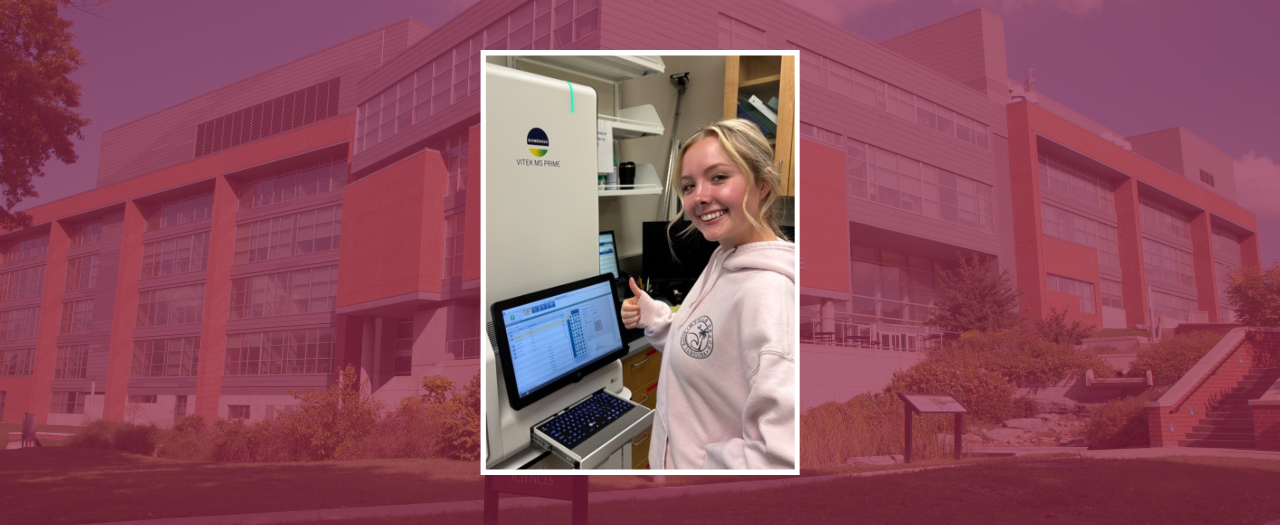Eastern Kentucky University (EKU) received a Major Research Instrumentation (MRI) award of $381,870 from the National Science Foundation (NSF) in Fall 2024 to purchase a state-of-the-art scientific research instrument. The award has led to the successful acquisition and maintenance of a microbial identification system, which can rapidly and accurately identify certain bacteria and pathogens.
“Our impressive Science Building houses high-tech labs and resources that fuel groundbreaking discoveries right here on our campus,” said EKU President David McFaddin. “We have science faculty working hand-in-hand with students on research in water quality, cancer treatment and diagnostics, solar energy, therapies for traumatic brain injury, and much more. Awards like this show how EKU’s reach extends beyond the classroom, giving students real-world experience and making a real impact in research advancements.”
The instrument added in EKU’s Science Building is a MALDI-TOF (matrix-assisted laser desorption ionization-time of flight) mass spectrometer. According to Dr. Jason Marion, professor of environmental health science at EKU and principal investigator for the award, the only other instruments like this in Kentucky and surrounding states would be housed in facilities such as state public health laboratories, academic medical centers and veterinary academic centers. Having this scientific equipment at EKU enhances the research infrastructure at the university and expands educational and research training opportunities related to microbiology, ecology, environmental science and laboratory science.
“The MALDI-TOF instrumentation is a game-changing instrument in modern microbiology and medical diagnostics,” said Marion. “This award and instrument will be used to simultaneously support the development of our students as future scientists while also addressing emerging research questions.”
As EKU’s first MRI award from the NSF, the new equipment has already started to engage undergraduate and master’s students in research initiatives.
Kylee Phillips, a senior biomedical sciences major and chemistry minor from Belfry, Kentucky, uses the MALDI-TOF for research comparing E. coli identification methods.
“Recent innovations using MALDI-TOF-Mass Spectrometry have improved the time and precision in obtaining bacteria species identifications for known clinical isolates of E. coli among many other bacteria,” said Phillips. “This instrument has become a gold standard for microbiological identification.”
In January, Phillips presented her research titled, “Comparison of Microscan and MALDI-TOF-Mass Spectrometry Identification Methods for E. coli Isolates from Natural Waters in Kentucky,” at Harvard University’s National Undergraduate Research Conference. At the conference, Phillips connected with other students from across the country and promoted her own research while also learning about research being conducted in other fields such as neuroscience, nutrition, technology and more.
“The university’s strategic priorities of knowledge, innovation and transformation are strengthened when faculty and students are actively engaged in research,” said Tiffany Hamblin, EKU’s director of sponsored programs. “Sponsored project funding is an important avenue through which faculty can engage in research that may not otherwise be feasible. It also enables powerful experiences for students that can set them on a unique path for academic and professional success.”
In addition to encouraging faculty-student research collaborations, Marion anticipates outreach opportunities as part of the project, where high school students will get exposure to the MALDI-TOF instrument in the Environmental Research Lab at EKU.
“By bolstering the research infrastructure at EKU and throughout the Appalachian region, this initiative seeks to increase the competitiveness of proposals that will provide more support for hands-on student research and increase the STEM workforce,” Marion said. “The project aims to accelerate research on microorganisms, paving the way for new discoveries and interdisciplinary collaborations.”
As the system supports the study of microorganisms using state-of-the-art chemistry, the MALDI-TOF instrument gives students access and experience with the type of equipment that would be applicable in careers from STEM to Health Sciences, including fields such as biology, environmental health science, medical laboratory science, agriculture, forensic science, public health and more.
Interested in a degree from EKU?
Earn your undergraduate, graduate or doctoral degree from a university that has been an education leader for more than 100 years. Choose from a variety of in-demand and nationally recognized academic programs, offered both online and on-campus.
Whether you want to start, finish or advance your education, EKU has a program that can fit your schedule and your needs. Complete the form to learn more about how EKU can help advance your career.
Eastern Kentucky University is accredited by the Southern Association of Colleges and Schools Commission on Colleges (SACSCOC) to award associate, baccalaureate, masters, educational specialist, and doctorate degrees.


